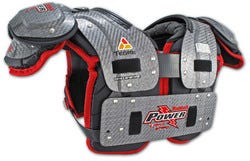Any given Sunday, Milliken’s PP composite makes for lighter, stronger shoulder pads
Sporting goods equipment supplier Riddell has chosen Milliken's Tegris thermoplastic composite for its next generation of shoulder pads, the LightSpeed. Tegris is primarily used as a composite armor material in military tactical vehicles, with some additional applications in motorsports, watersports, and construction applications. Milliken says its use here results in the lightest shoulder pads in football.
October 8, 2010
Sporting goods equipment supplier Riddell has chosen Milliken's Tegris thermoplastic composite for its next generation of shoulder pads, the LightSpeed. Tegris is primarily used as a composite armor material in military tactical vehicles, with some additional applications in motorsports, watersports, and construction applications. Milliken says its use here results in the lightest shoulder pads in football.

Riddell uses Milliken's Tegris composite for shoulder pads.
Tegris is made from a coextruded polypropylene tape yarn with a highly drawn core to provide the strength properties of a composite with a lower-melt polymer matrix. The tape yarn is woven into a fabric, with multiple layers of fabric stacked and consolidated with heat and pressure to form rigid sheets. The thickness of the sheets depends on the number of fabric layers in the structure. That sheet stock can then be used for panel applications or formed via pressure thermoforming processes.The required pressure is between 10 and 20 bar, and the temperature window is 140°C to 160°C. Milliken notes that convection heating or controllable (infrared) IR heat sources are effective. Fabric or sheet must be constrained via clamping during the heating and molding process, to prevent shrinkage. Due to its glass-free composition and relatively low pressure requirements, Milliken says aluminum molds can frequently be substituted for steel molds. Even rubber plug molds may be used on low production runs.
The company says Tegris provides a two to 15 times improvement in impact resistance over typical thermoplastic and thermoplastics composites, with the ability to act as armor against ballistic threats. Tegris also maintains this impact resistance at temperatures down to -40°C. Comprised completely of PP, Tegris also offers weight reduction over higher density glass-filled composite structures. A single layer of Tegris fabric is 0.005-inch (0.132-mm) thick and weighs 0.02 lb/ft² (0.11 kg/m²), which Milliken says allows for impact or stiffness requirements to be tuned with precision.
About the Author(s)
You May Also Like


